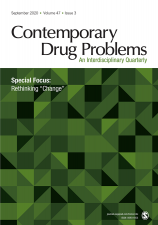Tracy R. Nichols, Ph.D., Meredith R. Gringle, Amber Welborn, Any Lee (10/2020)
Contemporary Drug Problems
Social Stigma And Perinatal Substance Use Services: Recognizing The Power Of The Good Mother Ideal
Volume 47, Issue 3
People who are diagnosed with a substance use disorder can experience stigmatizing interactions with health and social service providers, which may decrease both quality and continuity of care. For women with a substance-exposed pregnancy (SEP), this stigma can increase exponentially. Stigmatizing interactions can be difficult to identify due to social sanctions against expressing stigmatizing attitudes, beliefs, and behaviors and because stigma often resides in accepted cultural norms. Examining discourses around care provision can serve to identify instances of social stigma as well as illuminate the cultural norms in which they are embedded. Using data from a seven-year grounded theory study on perinatal substance use service provision, this paper reports on the perceptions and experiences of service providers working with mothers who have an SEP and illustrates complexities behind stigmatizing patient-provider interactions. Data collected included observations at meetings, workshops, and conferences addressing best practices across the continuum of care for perinatal substance use as well as interviews and focus groups with providers. The construct of “good mothering,” or hegemonic motherhood, was identified as an important cultural norm that supported social stigma and was embedded in providers’ interactions with mothers with an SEP. Discursive elements found in providers’ descriptions of perinatal substance use service work are presented and highlight the role of hegemonic motherhood as a stigmatizing agent.
